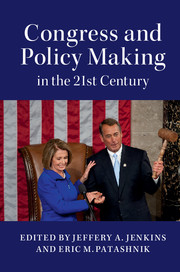Book contents
- Frontmatter
- Contents
- List of Figures
- List of Tables
- List of Contributors
- Acknowledgments
- 1 The Evolving Textbook Congress: Polarization and Policy Making on Capitol Hill in the 21st Century
- PART I CONGRESSIONAL POLICY MAKING IN A POLARIZED AGE
- PART II CONGRESS AND SOCIETY
- PART III CONGRESS AND ECONOMIC POLICY
- PART IV CONGRESS AND DOMESTIC POLICY DILEMMAS
- 9 The $40 Trillion Question: Can Congress Control Health Care Spending?
- 10 The Demise of Immigration Reform: Policy-Making Barriers under Unified and Divided Government
- 11 It's Hard to Get Mileage Out of Congress: Struggling Over CAFE Standards, 1973–2013
- PART V REFLECTIONS
- Index
- References
9 - The $40 Trillion Question: Can Congress Control Health Care Spending?
from PART IV - CONGRESS AND DOMESTIC POLICY DILEMMAS
Published online by Cambridge University Press: 05 February 2016
- Frontmatter
- Contents
- List of Figures
- List of Tables
- List of Contributors
- Acknowledgments
- 1 The Evolving Textbook Congress: Polarization and Policy Making on Capitol Hill in the 21st Century
- PART I CONGRESSIONAL POLICY MAKING IN A POLARIZED AGE
- PART II CONGRESS AND SOCIETY
- PART III CONGRESS AND ECONOMIC POLICY
- PART IV CONGRESS AND DOMESTIC POLICY DILEMMAS
- 9 The $40 Trillion Question: Can Congress Control Health Care Spending?
- 10 The Demise of Immigration Reform: Policy-Making Barriers under Unified and Divided Government
- 11 It's Hard to Get Mileage Out of Congress: Struggling Over CAFE Standards, 1973–2013
- PART V REFLECTIONS
- Index
- References
Summary
Congress faces few challenges as daunting as health policy. Health care is an issue that touches all Americans, triggering intense emotions as policy choices are framed as matters of life and death. It raises fundamental philosophical questions about the balance between government and markets, individualism and community, and rights and responsibilities. Partisan and ideological divisions on health policy are common, making agreement on remedies difficult. An array of powerful interest groups and constituencies inhabit the health politics arena, aggressively protecting their respective slices of the status quo. The United States has a fragmented nonsystem of health care that comprises a major portion of the American economy, with myriad entrenched public and private programs, further complicating the prospects for reform. Many Americans like their current insurance arrangements, are apprehensive of change, and are fearful of the specters of rationing and socialized medicine.
No wonder, then, that Congress's record in health policy making during the 20th century was mostly dismal. Campaigns to enact universal health insurance repeatedly died in the “Congressional graveyard” (Peterson 2005), as the United States gained the dubious distinction of being the only rich industrialized country with a large uninsured population. The 1965 enactment of Medicare and Medicaid did establish the government's role in providing health insurance to select populations, setting the stage for further expansions in subsequent years. Yet securing coverage for Americans who did not fit into sympathetic demographic categories proved difficult (Blumenthal and Morone 2009; Hacker 2002; Hoffman 2012; Starr 1982; 2011). Even as the uninsured population grew, American health policy oscillated between inaction and incrementalism, and efforts to break that cycle with comprehensive reform – such as the ill-fated Clinton health care plan of 1993–94 – ended badly (Hacker 1997; Skocpol 1996; Starr 1995). Gridlock ensnared Congressional health policy making, with health care bills more likely to fail than legislation from most other policy areas (Volden and Wiseman 2011). Widening partisan polarization in Congress meant that even efforts to reauthorize incremental, popular programs such as the Children's Health Insurance Program (CHIP) sparked controversy and partisan conflict (Oberlander and Lyons 2009).
Given this sobering history, the success of the Obama administration and Congressional Democrats in securing passage of the 2010 Patient Protection and Affordable Care Act (ACA, a.k.a. Obamacare) is all the more remarkable.
- Type
- Chapter
- Information
- Congress and Policy Making in the 21st Century , pp. 211 - 241Publisher: Cambridge University PressPrint publication year: 2016



